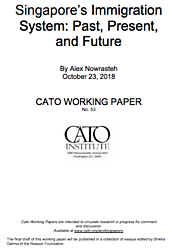Singapore is a wealthy city-state in Southeast Asia with many unique attributes: a harsh criminal justice system that employs corporal punishment, a functional democratic government where a single party has won every election since independence, and adherence to free trade and open capital market policies even though most other countries that gained independence at the same time embraced protectionism. Although Singapore’s immigration system is less well known, policy makers around the world should pay it attention.
Shortly after Singapore gained independence in 1965, it welcomed permanent immigrants and temporary foreign workers to labor in its growing economy. Part of the political demand for immigrants has been technocratic, but much of it has also been cultural. Lee Kuan Yew, the first prime minister of Singapore, argued that “[immigrants] will do many jobs better than the next generation Singaporean would because the next generation Singaporean will have been brought up in an easier environment that has not deprived him of enough basic necessities to make him really want to work so hard”1. As a result, Singapore’s immigration policy allows in so many workers of every skill level that 47 percent of all residents in 2017 were foreign-born.

